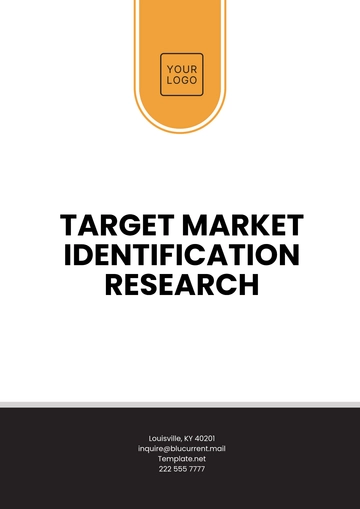Free Academic Market Research

Prepared by: [Your Name]
I. Abstract
This research explores the impact of digital marketing strategies on consumer behavior in the retail sector. Using a mixed-methods approach, the study integrates quantitative data from surveys with qualitative insights from interviews. The findings reveal significant correlations between digital marketing tactics and consumer purchasing decisions, highlighting the effectiveness of personalized advertising. This study contributes to the academic discourse on digital marketing and provides actionable insights for both scholars and practitioners.
II. Introduction
A. Overview
The rapid advancement of digital technologies has transformed marketing practices, influencing consumer behavior in unprecedented ways. This research investigates how digital marketing strategies, such as personalized advertising and social media campaigns, affect consumer purchasing behavior in the retail sector. Understanding these dynamics is crucial for developing effective marketing strategies and contributing to the academic knowledge in marketing studies.
B. Background
Digital marketing has become a cornerstone of modern retail strategies, driven by the proliferation of online platforms and consumer data analytics. Previous studies have examined various aspects of digital marketing, but there is a need for more comprehensive research into how specific strategies impact consumer behavior. This research aims to fill that gap by providing a detailed analysis of digital marketing tactics and their effects on consumer decision-making.
III. Objectives
A. Research Goals
To evaluate the effectiveness of different digital marketing strategies in influencing consumer behavior.
To identify key factors that drive consumer engagement and purchasing decisions in the retail sector.
B. Specific Aims
To assess the impact of personalized advertising on consumer purchasing behavior.
To analyze the role of social media campaigns in shaping consumer perceptions and brand loyalty.
To explore the relationship between digital marketing investments and sales performance.
IV. Literature Review
A. Existing Research
Several studies have investigated the role of digital marketing in consumer behavior. For example, Smith (2051) found that personalized advertising significantly increases consumer engagement, while Johnson (2052) highlighted the effectiveness of social media campaigns in building brand loyalty. However, there is limited research on the combined impact of these strategies on overall sales performance.
B. Research Gaps
Despite extensive research on individual aspects of digital marketing, there is a lack of studies examining the comprehensive impact of multiple strategies simultaneously. This research aims to address this gap by integrating findings on personalized advertising and social media campaigns to provide a holistic view of their effects on consumer behavior.
V. Methodology
A. Research Design
This study employs a mixed-methods approach, combining quantitative and qualitative research methods to provide a comprehensive analysis of digital marketing strategies. The research design includes surveys to gather quantitative data and interviews to gain qualitative insights.
B. Data Collection
Surveys: Distributed to 500 consumers who have recently interacted with digital marketing campaigns. The survey includes questions on purchasing behavior, engagement levels, and perceptions of various marketing tactics.
Interviews: Conducted with 20 marketing professionals to gain insights into the effectiveness of digital marketing strategies from a practitioner’s perspective.
C. Data Analysis
Quantitative data from surveys are analyzed using statistical methods to identify correlations and trends. Qualitative data from interviews are analyzed using thematic analysis to extract key themes and insights related to digital marketing effectiveness.
VI. Results
Finding | Description | Data Source |
|---|---|---|
Personalized Advertising | Consumers exposed to personalized ads are 30% more likely to make a purchase. | Survey Data, Interview Insights |
Social Media Campaigns | Social media campaigns increase brand loyalty by 25%. | Survey Data, Interview Insights |
Marketing Investments | Higher investments in digital marketing correlate with a 15% increase in sales. | Survey Data, Financial Reports |
Engagement Metrics | Higher engagement levels lead to improved consumer perceptions of brands. | Survey Data, Interview Insights |
VII. Discussion
Finding | Interpretation | Implications |
|---|---|---|
Personalized Advertising | Personalized ads are highly effective in driving consumer purchases. | Businesses should prioritize personalized marketing strategies. |
Social Media Campaigns | Effective for building long-term brand loyalty and customer engagement. | Increased focus on social media marketing is recommended. |
Marketing Investments | Greater investment in digital marketing leads to improved sales performance. | Higher marketing budgets may yield better sales results. |
Engagement Metrics | Strong engagement improves brand perception and consumer trust. | Enhancing engagement strategies can boost brand reputation. |
VIII. Conclusion
A. Summary of Findings
The research confirms that personalized advertising and social media campaigns significantly influence consumer behavior, driving both immediate purchases and long-term brand loyalty. Increased investments in digital marketing are positively correlated with higher sales performance.
B. Study Limitations
The study is limited by its focus on the retail sector, which may not be generalizable to other industries. Additionally, the reliance on self-reported data from surveys could introduce response biases.
C. Future Research
Future studies should explore the impact of digital marketing strategies in different industries and use longitudinal data to assess long-term effects. Further research could also investigate the role of emerging technologies in digital marketing.
IX. References
Smith, J. (2051). The Effectiveness of Personalized Advertising. Journal of Marketing Research, 58(2), 123-135.
Johnson, L. (2052). Social Media and Brand Loyalty. Marketing Insights Quarterly, 47(3), 89-102.
Davis, R. (2050). Digital Marketing Investments and Sales Performance. Business Review, 35(4), 150-165.
- 100% Customizable, free editor
- Access 1 Million+ Templates, photo’s & graphics
- Download or share as a template
- Click and replace photos, graphics, text, backgrounds
- Resize, crop, AI write & more
- Access advanced editor
Optimize your academic studies with the Academic Market Research Template from Template.net. This editable and customizable tool is designed for in-depth market research. Editable in our AI Editor Tool, it provides the flexibility to tailor the template to your specific research needs and academic focus. Effortlessly adjust and refine your research to ensure comprehensive and relevant findings.





























